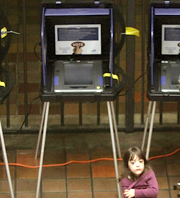Election 2008
A History of Super Tuesdays
Desiree Cooper
Angela Kim
FEBRUARY 2, 2008
- The Ballot Screen
- (Joe Raedle/Getty Images)
- View the Slideshow
Web Resources
Related Stories
- Sober Up and Fly Right
- Fighting to Throw the Race
- Mike Gravel, Still in the Running
- Voting Rights: Release or Restrict?
More From Desiree Cooper
More From Angela Kim
Desiree Cooper: We have more states than ever in history having a primary on the same day. It's like a primary-palooza. How did this happen?
Barbara Norrander: Well, it happened mostly by accident. You had individual legislatures changing the date of their presidential primary or their caucus to move up to the beginning of February which was sort of the first legal date according to the political parties that they could adopt a primary. And everybody wanted to be first. And as a result, you've got about 24 to 25 states on the same day.
I know we haven't had two dozen states on the same day but we've had Super Tuesdays before.
Yeah, we've had Super Tuesdays since the beginning of the 1980s and generally it was just any primary day when there were several states holding primaries on the same time. Back in the 1980s, it was more like a handful of states and the Super Tuesdays were scheduled in March rather than February. The only really planned Super Tuesday was in 1988 when the southern states coordinated their primaries in hopes it would give them more clout.
And how did that work out for them?
It didn't work out quite as well as they thought it would in part because there were five other states that had primaries on that same date so it kind of diluted the effect. And the Democrats, who had been the impetus for this reform, had hoped that a more conservative candidate could win in the Southern Super Tuesday. But it turned out to be a 3-way split between Gore, Dukakis, and Jesse Jackson that year.
Should we have learned something from them that they didn't try that one again?
What happened after that, in 1992, a number of the Southern states sort of moved away from the regional primary format because they found it cost their state too much in terms of funding an extra election, or because the state legislatures didn't want to have their primaries so early, or because they just found out the turnout wasn't as high as they expected and so some states reverted back to caucus format.
Would it solve the problem just to not have Iowa and New Hampshire as the first primaries? Is that what most people are mostly upset about? Because I hear that argument.
Well, some people are upset about that. They think it's unfair that these two particular states always go first. But those two states go first by accident. They moved their primary and caucus dates earlier in the schedule when it wasn't so important to win early. So you go back to the 1970s or earlier, it was often more important to win the last round of primaries before the convention rather than the first round. And so nobody really paid that much attention when New Hampshire set its early date.
I don't understand why they would move the date up.
Well, in the early 1900s, when the first round of presidential primaries were adopted, only about 15 states adopted primaries at that time and they were scattered across the spring months. And New Hampshire adopted an early -- I believe it was a March date at that time -- for their primaries so that it would coincide with their town meetings. And so they so they wouldn't have to open up the town hall twice. So it was being frugal in terms of conserving energy at the time. And the Iowa caucuses were moved up in the 1970s because they had a sort of a scheduling process where they had to have a variety of events. They have to have the local caucuses, and then a county level convention, then a congressional district convention, and the state convention. And trying to schedule all those -- I think they had a party rule that they had to be 60 dates apart -- in adding all those 60 days up, came into January.
Well Barbara, thank you for joining us.
Thank you very much for having me.
More stories from our Election 2008 series






Comments
Comment | Refresh
Post a Comment: Please be civil, brief and relevant.
Email addresses are never displayed, but they are required to confirm your comments. All comments are moderated. Weekend America reserves the right to edit any comments on this site and to read them on the air if they are extra-interesting. Please read the Comment Guidelines before posting.
You must be 13 or over to submit information to American Public Media. The information entered into this form will not be used to send unsolicited email and will not be sold to a third party. For more information see Terms and Conditions and Privacy Policy.